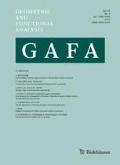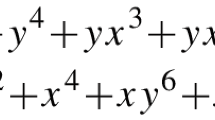Abstract
Let \({E \subset\mathbb{R}}\) be a closed set of Hausdorff dimension α. Weprove that if α is sufficiently close to 1, and if E supports a probability measure obeying appropriate dimensionality and Fourier decay conditions, then E contains non-trivial 3-term arithmetic progressions.
Similar content being viewed by others
References
Behrend F.A. (1946) On sets of integers which contain no three terms in arithmetical progression. Proc. Nat. Acad. Sci. USA 32: 331–332
Bluhm C. (1996) Random recursive construction of Salem sets. Ark. Mat. 34: 51–63
Bluhm C. (1998) On a theorem of Kaufman: Cantor-type construction of linear fractal Salem sets. Ark. Mat. 36: 307–316
Bourgain J. (1987) Construction of sets of positive measure not containing an affine image of a given infinite structure. Israel J. Math. 60: 333–344
Bourgain J. (1989) On Λ(p)-subsets of squares. Israel J. Math. 67: 291–311
Bourgain J. (1993) Fourier restriction phenomena for certain lattice subsets and applications to nonlinear evolution equations, I, GAFA. Geom. funct. anal. 3: 107–156
Dembo A., Peres Y., Rosen J., Zeitouni O. (2001) Thick points for planar Brownian motion and the Erdős–Taylor conjecture on random walk. Acta. Math. 186: 239–270
P. Erdős, My Scottish Book “problems”, in “The Scottish Book” (R.D. Mauldin, ed.), Birkhäuser, Boston (1981).
Falconer K. (1984) On a problem of Erdős on sequences and measurable sets. Proc. Amer. Math. Soc. 90: 77–78
K. Falconer, The Geometry of Fractal sets, Cambridge Univ. Press 1985.
Green B. (2002) Arithmetic progressions in sumsets, GAFA. Geom. funct. anal. 12: 584–597
Green B. (2005) Roth’s theorem in the primes. Ann. Math. 161: 1609–1636
Green B., Tao T. (2008) The primes contain arbitrarily long arithmetic progressions. Ann. Math. 167: 481–547
Green B., Tao T. (2006) Restriction theory of the Selberg sieve, with applications. J. Théor. Nombres Bordeaux 18: 147–182
Humke P.D., Laczkovich M. (1998) A visit to the Erdős problem. Proc. Amer. Math. Soc. 126: 819–822
J.P. Kahane, Some Random Series of Functions, Cambridge Univ. Press, 1985.
Kaufman L. (1981) On the theorem of Jarnik and Besicovitch. Acta Arith. 39: 265–267
T. Keleti, A 1-dimensional subset of the reals that intersects each of its translates in at most a single point, Real Anal. Exchange 24:2 (1998/99), 843–844.
KohayakawaY., Łuczak T., Rödl V. (1996) Arithmetic progressions of length three in subsets of a random set. Acta Arith. 75: 133–163
Kolountzakis M. (1997) Infinite patterns that can be avoided by measure. Bull. London Math. Soc. 29(4): 415–424
Kómjáth P. (1983) Large sets not containing images of a given sequence. Canad. Math. Bull. 26: 41–43
P. Mattila, Geometry of Sets and Measures in Euclidean Spaces, Cambridge Studies in Advanced Mathematics 44, Cambridge University Press, 1995.
Mockenhaupt G. (2000) Salem sets and restriction properties of Fourier transforms. GAFA, Geom. funct. anal. 10: 1579–1587
Roth K. (1953) On certain sets of integers. J. London Math. Soc. 28: 245–252
Salem R. (1950) On singular monotonic functions whose spectrum has a given Hausdorff dimension. Ark. Mat. 1: 353–365
Salem R., Spencer D.C. (1942) On sets of integers which contain no three terms in arithmetical progression. Proc. Nat. Acad. Sci. USA 28: 561–563
E.M. Stein, Oscillatory integrals in Fourier analysis, in “Beijing Lectures in Harmonic Analysis (E.M. Stein, ed.), Ann. Math. Study 112, Princeton Univ. Press (1986), 307–355.
Stein E.M. (1993) Harmonic Analysis. Princeton Univ. Press, Princeton
T. Tao, Arithmetic progressions and the primes, Collect. Math. Extra Vol. (2006), 37–88.
T. Tao, V. Vu, Additive Combinatorics, Cambridge University Press, 2006.
Tomas P.A. (1975) A restriction theorem for the Fourier transform. Bull. Amer. Math. Soc. 81: 477–478
P.A. Tomas, Restriction theorems for the Fourier transform, in “Harmonic Analysis in Euclidean Spaces” (G. Weiss, S. Wainger, eds.), Proc. Symp. Pure Math. 35:I, Amer. Math. Soc. (1979), 111–114.
T.Wolff, Lectures on Harmonic Analysis (I. Łaba, C. Shubin, eds.), Amer. Math. Soc., Providence, R.I. (2003).
Author information
Authors and Affiliations
Corresponding author
Rights and permissions
About this article
Cite this article
Łaba, I., Pramanik, M. Arithmetic Progressions in Sets of Fractional Dimension. Geom. Funct. Anal. 19, 429–456 (2009). https://doi.org/10.1007/s00039-009-0003-9
Received:
Accepted:
Published:
Issue Date:
DOI: https://doi.org/10.1007/s00039-009-0003-9



